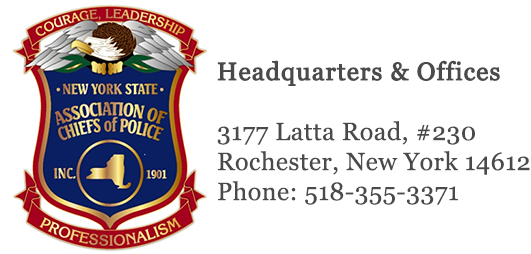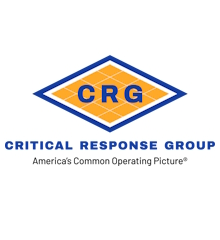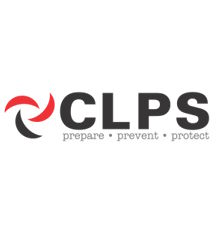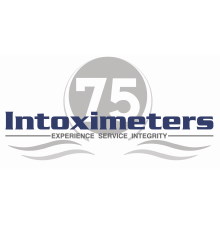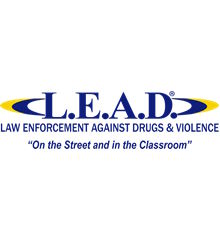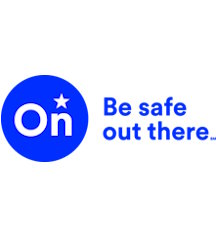|

NEW YORK STATE ASSOCIATION OF CHIEFS OF POLICE
TRAFFIC SAFETY POSITION STATEMENT - MARCH 14, 2025
The New York State Association of Chiefs of Police (NYSACOP) is uniquely poised to provide critical training and information to its members, foster communications among our state's police agencies and advocate for public safety to better enable today's police executives to enhance the safety and security of their communities. One important component of providing public safety is having a comprehensive traffic safety engagement program in place consisting of enforcement, public information and education and liaison with both engineering and emergency medical services. Traffic crashes and the deaths, injuries, property damage and economic losses that result, dramatically increased during the pandemic and are still a threat to safety on our roadways. Hazardous traffic violations, including but not limited to, impaired driving, speeding and other moving violations have also significantly increased. Not only does the data show this but also because of what our personnel and the public observe on our roadways every day. An agency's comprehensive traffic safety program produces long-term positive impact by reducing harm and improving quality of life, preventing and reducing crime and enhancing outreach and community service to the public we serve.
NYSACOP firmly believes that traffic safety is public safety and while recently there have been attempts around the nation, and New York State, to severely decrease, or even eliminate, traffic enforcement we will continue to advocate for fair and balanced traffic enforcement as a component of traffic safety engagement. Many traffic violations have the potential to cause a crash and thus enforcement of any violation may be warranted. While hazardous moving violations clearly contribute to crashes, so can minor violations that include, but are not limited to, uninspected vehicles that may have equipment defects such as inadequate brakes, bald tires and/or improper lighting.
Traffic stops should always be based on observing a Vehicle and Traffic Law violation, erratic driving and/or legitimate police information based on a vehicle description. In the absence of these scenarios, a traffic stop should not be conducted solely as a pretext for a potential investigation/interrogation. Additionally, while traffic violations can obviously happen anywhere, we strongly encourage data-driven analysis of crashes, violations and citizen complaints to determine when and where enforcement is needed most which will also result in effective deployment of resources.
NYSACOP and our members believe that training, culture and leadership are core principles of fair and balanced policing. We will provide ongoing training and a commitment to a culture of fair and balanced enforcement focused on strong leadership and vigilant supervision. Traffic enforcement should never be conducted simply for the purpose of issuing tickets and/or revenue generation. Instead the focus should be on terminating the offense, eliminating the risk and educating the motorist with the ultimate goal of voluntary compliance and safe roadways. Our traffic safety mission is to save lives and keep our communities safe by reducing the potential for harm. NYSACOP looks forward to working with our members and the public on this life-saving mission.
_________________________________________________________________________________________________

TALKING POINTS IN SUPPORT OF TRAFFIC SAFETY POSITION STATEMENT
- Traffic safety is public safety.
- A comprehensive traffic safety engagement program consisting of enforcement, public information & education and coordination with engineering and EMS produces positive outcomes by reducing traffic crashes and violations and the negative impact (deaths, injuries, economic costs) that they cause.
- Many crashes are caused by hazardous moving violations such as impaired driving, speeding, non- compliance of traffic control devices, etc. and law enforcement's primary traffic enforcement focus is on such offenses. However, even minor violations such as uninspected vehicles which could have inadequate brakes, bald tires, defective lighting and other equipment violations can contribute to crashes and as such may also warrant enforcement.
- Traffic stops should always be based on observing a violation of the Vehicle and Traffic Law or legitimate police information re. a vehicle description.
- Traffic enforcement also has the potential to reduce and/or prevent criminal activity. In some instances, a traffic stop may result in additional and necessary charges such as possession of firearms, drugs, wanted persons, etc. However, a traffic stop should not be conducted solely as an excuse for an investigation/interrogation.
- Traffic enforcement should never be conducted simply for the purpose of issuing tickets and/or revenue generation, instead it must focus on terminating offenses, eliminating risks and educating motorists with the ultimate goal of voluntary compliance and safer roadways.
- Fair and balanced policing is a core value of our policing model. Ongoing training of personnel, a commitment to a culture of equity and fair and balanced policing and strong leadership and supervision are key principles to ensure that we deliver high-quality service to our community.
- We look forward to engaging with the public on this important mission to save lives, reduce harm and keep our communities safe. Traffic safety is public safety!
|
